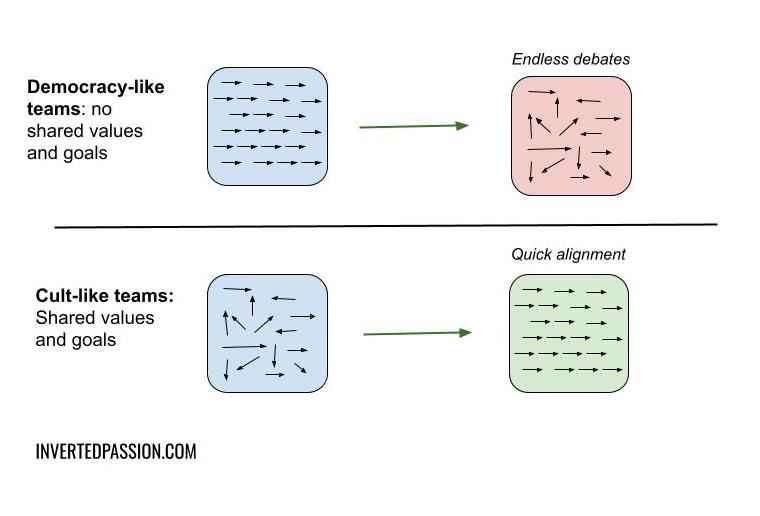Cults obsess about arcane stuff that nobody else cares about. Most of the time, they keep it to themselves and the rest of the world ignores them. But if they discover something valuable, the rest of the world benefits.

Most mainstream phenomena start as a cult. Veganism was once a cult, and so was the idea of the US as a country. Science began as a cult when the Royal Society of London adopted Nullius in verba as its motto. By asking its members to “take nobody’s word of it”, the Royal Society became attractive to certain people and extremely unattractive to other people. This cohesion of views is what laid the foundation of modern science’s growth from a startup to a major force in the world.
Startups should aim to be like cults because effective communication is impossible between people with different values. If you are someone who believes in “taking nobody’s word for it” and someone else has unquestionable faith in God, no matter how hard you both try, your communication is going to break at some point.
In the real world, democracy is great, and it is possible after a lot of effort and tons of debates for people to settle on a compromise. But companies are not countries. The objective of a business is to compete in the market of desires and to do that, they need to execute fast.
If your early team isn’t convinced that the world will be a worse place without your products or services, they simply won’t put the passion and energy required to make it happen. As an entrepreneur, you need to hire people who share the very same crazy view about reality as you. Of course, all of you could be wrong together (and that’s why most startups fail). But you’ll at least spend your energy on customers and market finding whether your problem-solution pair is valuable or not, and not in internal “alignment”.
How do you build a cult-like team?
People tend to hire people like them. But, if you hire someone with different values, and they’ll hire people like themselves. Pretty soon, your company will be a heterogeneous group that consumes all your energy in getting to an alignment.
This is why you should pay attention to the values of the person you’re hiring. For example, it’ll be disastrous for a startup to hire a genius who’s rude when everyone else in the team values respectful interactions (or vice versa). In this scenario, as a founder, you’ll find your energy consumed by telling the genius to tone down while telling others to be OK with a bit of “directness”. This is a big waste of time and energy. You’ll eventually start hating getting your team to “align”.
So, during interviews, focus on asking questions that reveal a person’s worldview and see that it aligns with your worldview.
The beauty of hiring for similar values early on is that after a while, it becomes self-sustaining. If the early team is homogenous, they will keep on hiring people who’re like them. So, as your company scales, you have to worry less about this. In fact, because of homogeneity, as the company grows, not having enough dissenting views becomes a problem. Cults become detrimental later in the company’s growth later on, but early on, they’re absolutely required.
What about diversity?
I’m not advocating hiring clones. Diversity is useful, but only as long as it’s the diversity of the right kind. An entrepreneur will gain tremendously from the diversity of experiences in his/her team. All experiences are useful data points. In a homogenous group with similar values, varying experiences enrich everyone. What someone else knows that you don’t is valuable.
The perfect combination of a group composition is of different experiences but similar values.
However, this combination is hard to find because people’s experiences shape their values. So if you’re able to find someone with different experiences than you but has a very similar worldview, hire them immediately. But beware of championing diversity without understanding what kind of diversity you are creating.
Remember: when speed is everything for a startup, cult-like teams are faster than democratic teams
This essay is part of my book on mental models for startup founders.
Join 150k+ followers
Follow @paraschopra